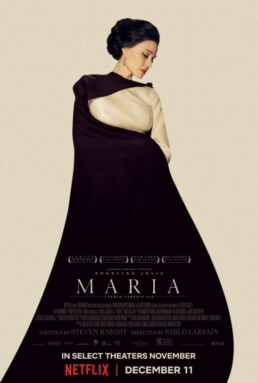‘Maria’ Review: The Songbird Leaves the Cage
'Maria' blends the traditional biopic with surreal hallucinations and flashbacks, giving it a unique narrative structure.
Director Pablo Larraín completes his trilogy of tragically glamorous women biopics in Maria, the story of famed opera singer Maria Callas. His first entry came in 2016 with the Natalie Portman-led Jackie, based on First Lady Jacqueline Kennedy, as she fights through grief and trauma post-JKF assassination. In 2021, Larraín crafted a stunning portrait of Princess Diana in Spencer. The film starred Kristen Stewart who gave a riveting performance as the headstrong Lady Di, earning her an Oscar nomination for Best Actress. On the heels of such positivity and accolades for Larraín’s previous biopics, it seemed obvious that Maria, starring Angelina Jolie, would be another electrifying entry. However, with only one Oscar nomination for cinematography, it seems the operatic force of Maria has fallen on deaf ears.
Reimagine the Legendary Soprano in Her Final Days
Running just over two hours long, Maria tells the story of the world’s greatest opera singer. The film takes place one week before her untimely death and recounts the last days of her life in 1970s Paris. Despite her glamorous public facade, the film uncovers that behind closed doors, Maria’s life was anything but pitch perfect. Her unresolved health issues, tumultuous love life, and identity as a singer who now struggles to perform at her previous standards, envelop her in heartache and tragedy. Her goddess-like demeanor and ethereal voice mask a somberness that affects the life of a creative. The pain is never far away, but accessing that pain is exactly what makes Maria’s art so poignantly beautiful.
You Can Only Suspend Your Disbelief For So Long
Maria Callas offers something of a comeback for Angelina Jolie, whose last role was playing Thena in 2021’s Eternals. Maria is a role that Jolie seems born to play. From her striking beauty to her American-Greek accent, Jolie seems to effortlessly transform into the complex headspace of the tortured singer. She brings out a sensitivity and humanness that makes us feel like we understand the inner workings of Callas’ mind. However, the appeal of Jolie playing the titular prima donna is also the film’s biggest distraction.
It’s quite contradictory. The scenes when Maria Callas is in dialogue with journalist Mandrax (Kodi Smit-McPhee), her house staff Bruna (Alba Rohrwacher) and Ferruccio (Pierfrancesco Favino), and her secret lover Aristotle Onassis (Haluk Bilginer), is when the film feels strongest. It only takes Jolie mimicking Callas’ extraordinary operatic singing for reality to kick in and pop any suspension of disbelief. Despite her best efforts, these moments look like obvious miming. It’s very apparent that Jolie isn’t singing and while this isn’t a knock on her performance as a whole, these moments come off as overstriving and caricaturistic.
Takeaway
Maria blends the workings of a traditional biopic with surreal hallucinations and flashbacks, giving the film a unique narrative structure. Fans of classical music will find that Maria stays true to preserving the magic of the art form by showcasing it in such an aspirational and grandiose manner. Every song on the film’s soundtrack is devastatingly beautiful, and I’ve had it on repeat ever since watching the film. Maria may not have earned a standing ovation as far as the Academy’s voting body is concerned, but there is no denying that director Pablo Larraín is a master storyteller. And to Angelina Jolie, who brought Maria Callas to life by exposing her genius and singular talent to younger audiences, I say Bravo!
Morgan Rojas
Certified fresh. For disclosure purposes, Morgan currently runs PR at PRETTYBIRD and Ventureland.


